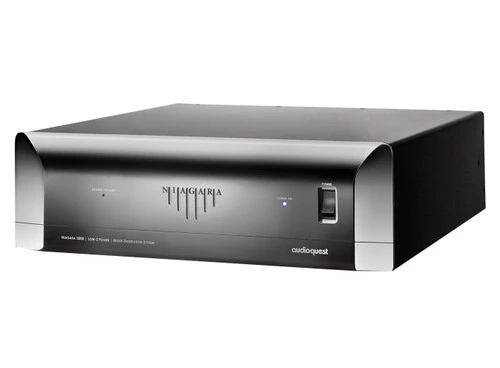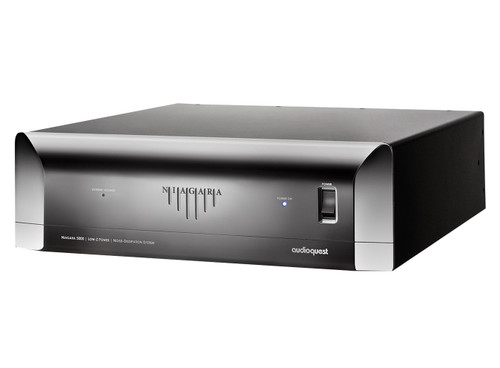


Music lovers can finally experience the clarity, dimensionality, frequency extension, dynamic contrast, and grip their A/V systems have been capable of delivering — if only the power had been right!
The science of AC power delivery is not a simple one; it demands focus, and the devil is in the details. In fact, the great increase in airborne and AC-line-transmitted radio signals, combined with overtaxed utility lines and the ever-increasing demands from high-definition audio/video components, has rendered utilities' AC power that is currenlty used a somewhat antiquated technology.
Where Alternating Current (AC) is concerned, a century-old technology is relied on for incandescent lights and electric motors—technology that was certainly never meant to power the sophisticated analog and digital circuits used in today's premium audio/video systems. To properly accommodate the promise of today's ever-increasing bandwidth and dynamic range, extraordinarily low noise must be achieved across a very wide range of frequencies.
Further, today's power amplifiers are being taxed for instantaneous peak-current demand, even when they're driven at modest volumes. Although a substantial increase in dynamics has been seen from much of audio software today, the loudspeakers employed to reproduce them are often no more efficient than they were two to four decades ago. This places great demands on an amplifier's power supply, as well as the source AC power supplying it.
A systems' sensitive components need better alternating current - a fact that has resulted in a host of AC power conditioning, isolation transformer, regeneration amplifier, and battery back-up system topologies. Through differential sample tests and spectrum analysis, it can be proven that up to a third of a high-resolution (low-level) audio signal can be lost, masked, or highly distorted by the vast levels of noise riding along the AC power lines that feed components. This noise couples into the signal circuitry as current noise and through AC ground, permanently distorting and/or masking the source signal.
Given that the stakes are so high, all sincere attempts to solve this problem must be applauded.
Once the audio/video signal is gone, it's gone forever...
For Audioquest, honoring the source is never a matter of simply using premium "audiophile-grade parts" or relying on a proprietary technology—common approaches within the community. For years, AQ has been witness to the same, seemingly endless audiophile debates: valves versus transistors; analog versus digital; can cables really make a difference?; and on and on. While AQ, too, can brag about their many unique technologies, they realize that true audio/video optimization is never a matter of any one secret or exotic circuit. When it comes to noise filtering for AC power, many approaches can yield meaningful results. However, these approaches may also impart ringing, current compression, and non-linear distortions that can render the cure worse than the disease!
The Niagara 5000 features Audioquest's patented AC Ground Noise-Dissipation System, the widest bandwidth-linearized AC filter in the industry, and AQ's unique passive/active Transient Power Correction Circuit. Boasting an instantaneous current reservoir of over 90 amps peak, the Niagara 5000 is specifically designed for today's current-starved power amplifiers. Many AC power products featuring "high-current outlets" merely minimize current compression; the Niagara 5000 corrects it.
Though it's easy to tout a given technology, it's quite another thing to create a solution that is consistent, holistic, functional, and that honors verifiable science. It's not enough to reduce AC line noise and its associated distortions at just one octave, thus leaving vulnerable the adjacent octaves and octave partials to noise, resonant peaking, or insufficient noise reduction. Consistency is key. One should never accept superior resolution in one octave, only to suffer from masking effects a half-octave away and ringing artifacts two octaves from there. This is the principal criterion for Audioquest's Low-Z Power Noise-Dissipation System.
The Niagara 5000 represents over 20 years of exhaustive research and proven AC power products designed for audiophiles, broadcast engineers, and professional-audio applications. Every conceivable detail has been addressed: In the Niagara 5000, one will find optimized radio-frequency lead directionality, capacitor run-in forming technologies developed by Jet Propulsion Laboratories and NASA, and AC inlet and outlet contacts with heavy silver plating over extreme-purity copper, assuring the tightest grip possible.
A great system is built from a solid foundation, and that foundation starts with power. With an Audioquest Niagara 5000, experience for the first time the clarity, dimensionality, frequency extension, dynamic contrast, and grip your system has always been capable of delivering - if only the power had been right!
Audioquest welcomes you to experience the Niagara 5000 and hear firsthand the remarkable results of highly optimized power management: startlingly deep silences, stunning dynamic freedom, outstanding retrieval of ambience cues, and gorgeous delineation of instruments and musicians in space. Once you've experienced it, it may seem so elegant, so logical, and so obvious that you find yourself wondering why it hadn't been done before.
All power conditioning products claim to do the same thing: lower the various current and ground noises generated by your power grid and the wiring in your house and system. The difference between the Niagara and most of its competitors is that the Niagara 5000 does this task demonstrably well, raising low-level resolution of detail and reducing background hash (making for a clearer, better-defined soundstage and more neutral timbre top to bottom) without choking off current delivery.
Specifications/Compliance:
• Surge Suppression: Non-sacrificial (nothing to damage with repeated 6000V/3000A input surge tests, which is the maximum that can survive through a building’s AC electrical panel).
• Extreme Voltage Shutdown Voltage: 140VAC (will activate the main high-current relay to open within less than 0.25 second; automatically resets once the incoming power is within a safe range).
• Common-Mode Noise Dissipation: In excess of 30dB from 20kHz to 100MHz, linearized for dynamic (rising) line impedance with frequency (source) and 10 to 50 ohm load, system current dependent.
• Input Current Maximum Capacity: 20 amps RMS (total).
• Ultra-Linear Noise-Dissipation System AC Power Outlet Banks: 4 Isolated groups – total (bank three through six).
• Number of AC Outlets: 12 (4 High Current/Transient Power Correction; 8 Ultra-Linear Noise Dissipation System Power).
• Power Consumption: Typically, less than 0.25 amps at 120VAC input, or with the power correction switched to Standby setting. (This is dependent on a reactive vector load. For more info, see “Operation and Continuous Use: Rear-Panel Power Correction Switch – Niagara 5000 current draw.”)
• Dimensions: 17.5" W x 5.24" H x 17.2" D (3-RU rack-mounting ears, optional)
• Weight: 38 lbs.




 Turntable Accessories
Turntable Accessories Headphone Accessories
Headphone Accessories Cable Accessories
Cable Accessories Vinyl Accessories
Vinyl Accessories Compact Disc Accessories
Compact Disc Accessories













